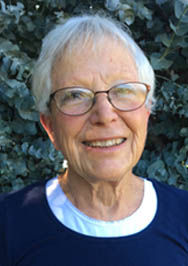This unsurprising announcement issued forth from my son, Martin, when we crossed paths in the shop this morning.
Oddly, it didn’t have the shock value that last week’s warning held. This is the new normal!
Our farm in Alexander Valley, like most property outside the Healdsburg city limit in our area, was without power and water (we are well-dependent) for about three days — or was it four? No matter. It was enough to thaw the frozen food and sour the milk.
A major discussion topic fanning through the county was: “How to Best Keep Food Edible in a Kitchen Refrigerator Without Power.”
Some suggestions: buy bags of ice or even better, blocks of ice for the interior; don’t open the refrigerator door; and my favorite – start eating solely from the refrigerator and refrain from buying any new food.
This last bit of practical reasoning resulted in my son, Dave, responding, “Fix yourself a nice bowl of mustard.”
Laughter IS the best medicine. Can’t you just imagine the family gathering ‘round the table with their little cardboard bowls and plastic spoons looking at the evening’s spread – bowls of mayonnaise, pickle relish, ketchup and cubes of butter – all over wilted lettuce?
Having no power, compounded with no well pressure, is most certainly inconvenient and I do more than my share of complaining. However, it needs to be said as well as written that when the television news does come back on, the world’s plight isn’t pretty. The Kinston Trio’s tongue-in-cheek Merry Minuet lyrics out of the sixties is as true now as it was then:
“They’re rioting in Africa, they’re starving in Spain. There’s hurricanes in Florida, and Texas needs rain. The whole world is festering with unhappy souls. The French hate the Germans, the Germans hate the Poles. Italians hate the Yugoslavs, South Africans hate the Dutch, and I don’t like anybody very much.”
Only some of the names need to be updated – like “Syrians hate Israelis and Turkey hates the Kurds; the Brits, Scotts and E.U. still war over words.”
No amount of electrical grid shut-down compares with the terror of families running from bombs, wildfire, floods or other catastrophic threat.
Yet, close to home, there is that new normal at this time, as we await welcome rain in California. One thing I learned is that a little water can save a plant. It doesn’t have to be much – and it can be leftover gray water.
For animals, the purchase of some aluminum water holding tubs came in handy for dipping smaller water bowls and filling watering cans. This time around I am going to consolidate the frozen food which has been prepared from the farm. Instead of two half-filled freezers there will be only one. Apparently, the fuller the freezer the easier it is to keep the temperature low. And generators are a MUST so get busy, young engineers! The future is in hand-held generators delivered to your door by drone.
Speaking of drones coming to your door, a few weeks ago a balloon holding eight or nine people floated across our farm and landed fifty yards onto our neighbor’s property. Nobody was in the vicinity except my daughter, Sarah, and I.
The balloon must have run out of wind and was forced to land. The problem was: it was land-locked by fencing. The rescue folks arrived in two vehicles, a small bus for the occupants in the balloon basket, and the truck and trailer with the four-man team that would secure the basket, collapse the balloon, and haul it away. But, there was no access.
Two hours later, rearranging our property a bit, and squeezing the truck and trailer through a small road between the hoop house and our water-storage tank, the rescue squad was able to anchor the basket so the folks could get out. I was unaware until that day that the inhabitants of a balloon basket cannot exit simply because they are on the ground.
“They’re my ballast!” responded the pilot, when I asked if the people could get out while the access problem was being solved.
If revisitation occurs during the next electrical grid shut-down, I’ll bring the bowls of mustard and other condiments out to the basket prisoners.
Renee Kiff weeds and writes at her family farm in Alexander Valley.








